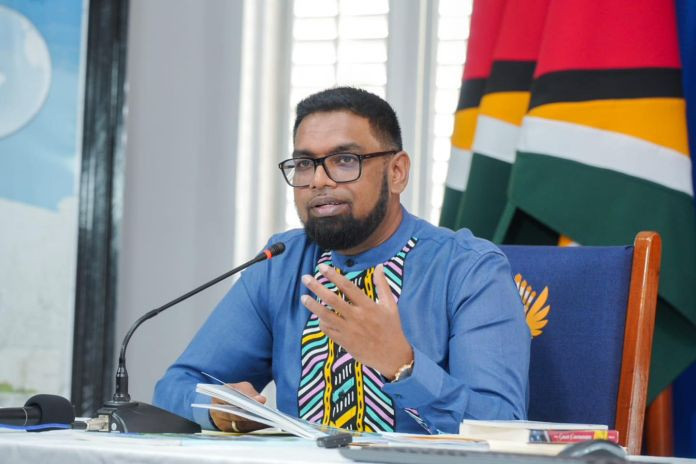GEORGETOWN, Guyana, (DPI) – Cementing its place as the fastest-growing economy in the world, Guyana is projected to grow at an average 25 percent annually from 2023 to 2026, with growth in the non-oil sector projected at 7.9 percent this year. This will build on the 11.5 percent growth in the non-oil sector last year.
The country continues to experience economic growth inspite of the various crises currently facing the globe, largely driven by food and climate insecurity.
President, Dr Mohamed Irfaan Ali disclosed this information during a press conference held at the Office of the President, Georgetown, on Wednesday.
He told media operatives that Guyana’s economy has almost tripled since the end of 2020, with the nominal Gross Domestic Product (GDP) moving from $1.1 trillion in 2020 to $3.1 trillion at the end of 2022.
This, he said, is largely owing to the start-up of oil production on the Liza Unity FPSO.
“Despite challenges, Guyana managed to grow its economy and put measures in place to reduce the burden of elevated prices on citizens, while at the same time, prudently managing financial resources,” president Ali pointed out.
This was demonstrated when, at the end of 2022, Guyana’s debt-to-GDP ratio stood at 24.6 percent. The reduction is significant when compared to a ratio of 38.9 per cent just one year prior.
This, the president said, demonstrates the government’s commitment to prudent fiscal management for the country’s resources.
“If you look at economic growth estimates, the world is estimated to grow at 2.8 percent in 2023, advanced economies are expected to grow at 1.3 percent, Latin America and the Caribbean, 1.6 percent, Caribbean tourism-dependent countries at 3.2 percent, Caribbean commodity exporters, 18.7 percent. Guyana is expected to grow at 25.1 percent,” he outlined.
In 2020, global inflation spiked, driven by supply chain issues, many of which were attributed to the COVID-19 pandemic, volatility of energy prices, and numerous supply shortages around the globe.
It is estimated that global inflation currently stands at 6.1 per cent, while inflation for Latin America and the Caribbean stands at 11.8 percent. Guyana is estimated to have a 3.8 per cent inflation rate.
The government, upon entering office, took several alleviatory actions to reduce the cost of living burden on Guyanese. This included the removal of more than 200 fees and taxes on essential goods, which were implemented by the APNU+AFC administration; restoring subsidies on electricity and water, to the benefit of over 28,000 pensioners, increasing the old-age pension by 61 percent, and restoring and increasing the ‘Because We Care’ cash grant for students from $10,000 to a current $35,000.
The government has expressed intentions of continuing to increase the cash grant until, paired with the $5,000 uniform voucher, the monetary value being returned to each learner is a minimum of $50,000. Currently, learners receive $40,000 per school year.
Guyana recording highest FDI inflows in Caribbean indicates strong investor confidence in the economy and the country’s leadership.
Guyana recording the highest Foreign Direct Investment (FDI) inflows in the Caribbean for two consecutive years is indicative of investors’ confidence in the country and its leadership.
The United Nations (UN) Economic Commission for Latin America and the Caribbean (ECLAC) ‘Foreign Direct Investment in Latin America and the Caribbean’ 2023 report stated that Guyana recorded FDI inflows for 2022 totalling US$4.389 billion.
“FDI is an important indicator of the confidence that investors have in the country. So, we are not only the leading destination for FDI, it tells a lot about the confidence which the sophisticated and international investor has in the country, the leadership, the direction in which the country is going,” president Ali told reporters Wednesday.
The head of state pointed out that a number of internationally branded hotels are currently under construction and when completed will create thousands of jobs for Guyanese and with more jobs comes an increase in disposable income for families.
“Additional income means more family wealth, more individual wealth, more community wealth, more national wealth, more spending in the economy. [When] you have more spending in the economy, you have more demand for service, more demand for service increases supply, supply of services increases revenue, increase revenue triggers spending, so it’s a cycle,” Dr Ali explained.
The president also disclosed that on international trips foreign private sector investors as well as governments continue to engage his administration on possible areas of collaboration for investments. Another signal of their confidence in the direction the country is headed.
Meanwhile, in relation to employment opportunities, president Ali estimates that by 2025, Guyana would need some 6,000 new employees in the hospitality sector, judging from the number of hotels that will be established, with approximately 2,000 health workers needed in various sectors.
He noted also that many local companies are losing expert workers to the oil and gas companies, thus leading to a demand for skilled labour in traditional sectors.
Additionally, with the entrance of new companies in the areas of specialised warehousing and fabrication, among others, thousands of employees would be required to fill those jobs.
The head of state, while the government is creating the enabling environment to attract foreign and local investments in key sectors, it is simultaneously building the human resource capacity to match the rapid development unfolding daily.





